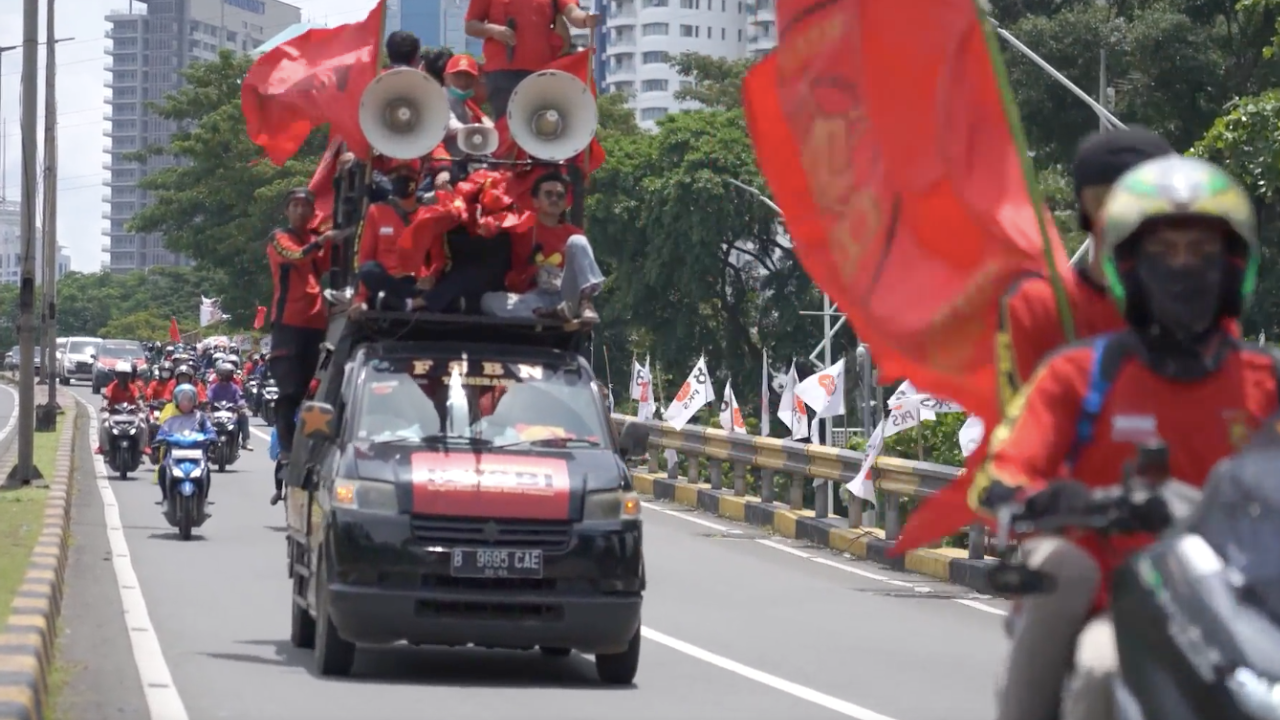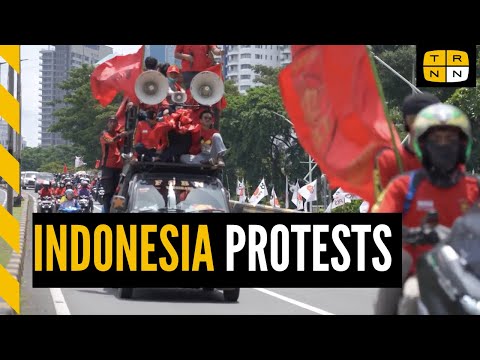Trade unions in Indonesia are mobilizing workers by the thousands to protest the 2020 Omnibus Bill, which significantly undermines many labor protections won under the 2003 Labor Law. President Jokowi Widodo argues that more labor flexibility is necessary to attract foreign investment. Workers note that the promise of increased prosperity comes directly at their expense. The Real News reports from Jakarta.
This story, with the support of the Bertha Foundation, is part of The Real News Network’s Workers of the World series, telling the stories of workers around the globe building collective power and redefining the future of work on their own terms.
Producer: Akbar Rafsanjani
Videographer: Lexy Rambadeta
Video editor: Leo Erhardt
Transcript
Raiis Rathib (Narrator): Thousands of workers have been resisting the Indonesian government’s Omnibus Bill on job creation, which the House of Representatives passed on October 5, 2020. This new law attacks labor rights since it does not provide job security and provides leeway for employers to fire workers.
Sunarno, Chairman of the Congress of Indonesia Unions Alliance (KASBI): “Today we want to convey our aspirations to the House of Representative, But what have we witnessed here my friends? In front of us we stand valiantly, firmly, on the walls and barbed wire my friends, is this what is called the people’s right to express opinions but is never heard, but only the walls to listen!”
Raiis Rathib (Narrator): The new law significantly reduces protections for workers under the 2003 labor law, including on minimum wages, severance pay, vacation, maternity benefits, and health and child care, and abolishes legal protections in permanent employment contracts. The roughly 1,000-page law was largely drafted by the business community, with little consultation from labor unions and other affected groups.
Sunarno, Chairman of the Congress of Indonesia Unions Alliance (KASBI): People who have just started work or are in the recruitment process, on average they are no longer permanent employees. The system implemented is outsourcing, internship and daily freelancing. For the contract outsourcing systems there are also changes for up to five years.
This means that workers who work in this system have low probability of being appointed as permanent workers. Later they will still work as contract laborers, it may even be difficult for the younger generation to become permanent employees. They no longer have freedom of association.
Even the title of this omnibus law is The Job Creation Law or government regulation in lieu of law, it actually contradicts with the goal of creating jobs itself. In fact, these two or three years have seen massive layoffs. When hiring takes place, the approach typically involves outsourcing and giving internships.
Emilia Yanti Siahaan, General Secretary of The Center of Indonesian Labor Struggle (GSBI): Deprivation of labor rights, deprivation of our rights, deprivation of union rights. There is no certainty of work, no wages. The Omnibus Law of job creation opens the way and gives more legitimacy to employers to deprive workers of wages, to exploit workers.
The same thing also happened in the agricultural sector experienced by the peasants. The Job Creation Law became a way for Jokowi (president of Indonesia), became a way for capitalists to monopolize foreign land to further monopolize to continue to seize people’s land.
In several practices, companies have begun to eliminate women’s rights, such as menstruation leave because menstrual leave is equated with sick leave. Where the previous legal regulations, menstrual leave was a right that could be obtained by workers on the first and second day when they menstruate.
But now the company’s practice is that they have to be really sick before they get time off and have bed rest during their periods. This is one of the impacts where the government through the law equates the position of workers with employers as equals, so that they can negotiate for themselves.
Sri, Member of the Congress of Indonesia Unions Alliance (KASBI): With this Omnibus Law they will make permanent employees become contract employees, so that companies don’t need to issue THR (religious holiday allowance), severance pay, and BPJS (Social Insurance). So, this oppression is real.
The Indonesian’s condition is just sad now. Politicians say “I defend the people”, “I defend the people’’
And that’s a lie.
No one cares about us anymore. The proof is that many parties support the Omnibus Law. If we want to change our own fate, we have to fight alone. There is nothing to rely on anymore. So sad.
Rathib (Narrator): The Constitutional Court ordered the government to amend key parts of the legislation within two years of the law’s passage. Jokowi’s emergency regulation, which required parliament’s approval, was designed to fulfil the court’s request. The new regulation isn’t radically different from the original legislation; it contains some improved provisions, including minimum wages for outsourced workers.
Jokowi first proposed an Omnibus Law to boost Indonesia’s regional competitiveness in October 2019 aimed to simplify the application process for business licenses across all business sectors, including land acquisition permits, to create more jobs, boost infrastructure development, and attract foreign investment.
Public consultation was lacking, and it was difficult for the public to obtain an official version of the draft bill, which contains about 185 articles in 15 chapters.Government told parliament that the new law was necessary to bolster Indonesia’s competitiveness in uncertain times, including climate change, the Russia-Ukraine war, and the continuing economic fallout from the COVID-19 pandemic.
The trade unions aim to continue putting pressure on the government in the hope more protections will be provided for workers. If it’s up to the workers here today, they will continue to take to the streets until the government listens.
Help us improve our international labor coverage by taking this quick survey
It should only take two minutes, and all answers are confidential.




